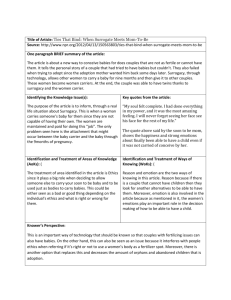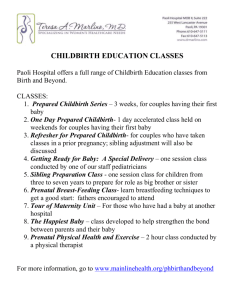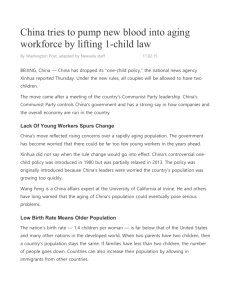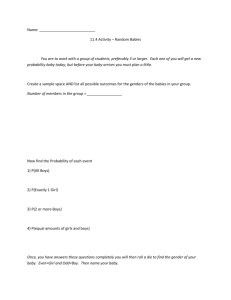CHINA'S One Child Policy
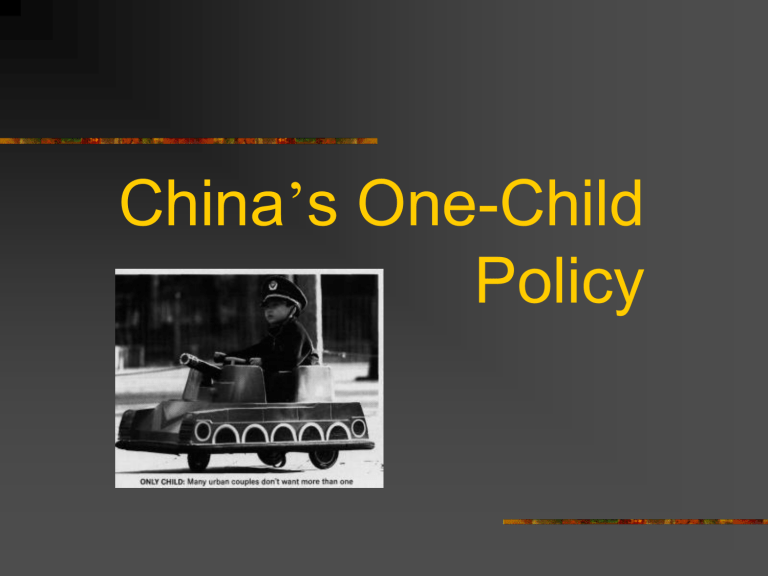
China ’ s One-Child
Policy
Why Does The Policy Make
Sense?
Unemployed? Employed for a short period only? Is finding work getting harder each day?
Well be prepared for it to get even HARDER … because every time a child is born, there ’ s one more person out there taking YOUR job.
Continued
…
Famine and poverty can be a thing of the past!! Having just one child leaves more money to concentrate on your career and have some spare cash for those luxuries we all deserve – increase your quality of life and take you ’ re family on holiday!
Continued
…
Having less children increases your one child ’ s standard of life, it will enable your child to have more opportunities, for you to concentrate all you have on loving that child and providing for it. By having more that one child you are depriving and robbing your first born of a better education and life. You owe it to your child to not be selfish, you have a duty as good parents.
Continued
…
WOMEN, you no longer live in a world where you should be discriminated against, you are EQUAL to men and have the right to go out and earn money just as much as them
–
you should not have to be told how many children to have and be made to stay at home looking after many children
– you choose
to have one child.
Benefits of the Policy
…
The policy encourages female independence and the opportunity to truly be equal within the work place, and not have to look after infants in the home.
Improves standard of living for families and increases money available for ‘ luxury ’ . Less poverty.
Education is costly and less children means more money can be spent on the one child to become more highly educated.
Continued
…
Less children means less mouths to feed - which means the food that is available in China can go around. Famine is not as much of a threat.
Less children means less competition for jobs when people are old enough to work, this means that the rate of unemployment and under employment decreases.
The problem of overpopulation decreases : “ the rule has been estimated to have reduced population growth in the country of 1.25 billion by as much as
300 million people over the past twenty years.
”
The Facts of the One Child Policy
The One Child policy has greatly affected the sex ratio within China, as the culture is rooted bias against females. This means that as only one child is aloud to be born, infanticide has greatly increased, and more female babies are left to die.
More boys are required within rural area for a workforce.
Abortions upon second pregnancies are also highly encouraged. They are also enacted right up until the last moment.
Continued
…
Lengthy process of being allowed to try for a baby and watched over by various people where they live and in the work place.
Penalties for having a second child in forbidden circumstances such as fines (or in rural areas livestock etc), benefits taken away and ones given for the first child must be paid back, which can be up to a whole year ’ s salary.
However some peasants are encouraged to have a second child in order for them to have to pay a fine, as the smaller the population, the less money from income tax.
Changes to the Rule
Due to the increasing difference between the sex ratio, now 118 boys:100 girls (usually
105:100) and also an increase of neglect, infanticide, abandonment and abortion of female babies, some couples with their first child being a girl are allowed to try for a second male baby.
In order to avoid a drastic decrease in population, if a both people wishing to begin a family are sibling-less, they are allowed to have two children, legally.
How the Policy Is Enforced
Couples must apply to be able to try for a baby, they are then considered and told when they can begin.
They can only register babies with registration cards, which are issued by their employers.
‘ Busy-bodies ’ are established around the workplace and ask women questions about themselves and their family plans, they then report the information back to the workplace ’ s nurse etc.
Continued
…
There are also people around the villages keeping an eye on the local women, advising them on the benefits of one-child families and pressuring them into abortions if they become pregnant a second time and also sterilisation.
Penalties also deter people from having a second child as many families cannot afford the fines (as much as 10 000 yuan) or paying back the benefits they have received.
Failure of the Policy
…
Many of the actions taking place under the policy are inhumane:
As the families prefer to have a male child rather than a female, many baby girls are left to abandoned or left to die in ‘ dying rooms ’ .
Abortions of a second or female child are enacted right up until the last minute - a baby can be born and still given a lethal injection
(inserted into the head) as long as it hasn ’ t taken it ’ s first breath.
Continued...
As the ratio girls to boys decreases, it means
‘ bachelor boys ’ evolve, which means that theoretically there will not be enough women to marry men and therefore around 15-18 to every 100 will be left single.
As many families now only have one child, that child becomes spoilt as the parents indulge upon it, this cause an increase in ‘ little emperors ’ and obese children growing into adults.
It could be considered against human rights to be dictated as to how many children you can have.
Continued
…
“The TFR [total fertility rate] never fell below a 2.5 child-per woman average in rural areas, although it dropped to about 1.2 in urban areas. By the mid-
1980s, less than one-fifth of all eligible married couples had signed the one-child certificate - a contract which granted couples and their child economic and educational advantages in return for promising not to have more than one child.
Throughout the 1980s, nearly half of all reported births were second, third, or higher order births.
Various surveys suggested that the desire to have at least two children remained strong among Chinese couples” (Tien, et al 1992, p.11).

